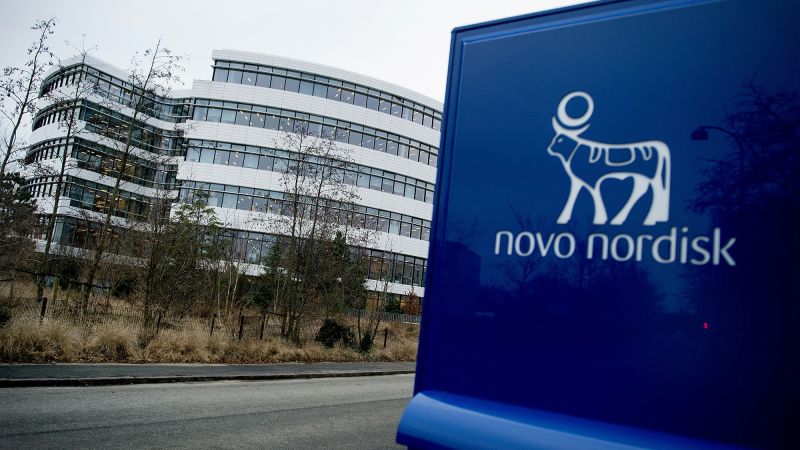Since its launch in 2017, Ozempic has revolutionized treatment options for type 2 diabetes, with Novo Nordisk and Eli Lilly emerging as leading competitors in developing more effective drugs in the GLP-1 receptor agonist category. These drugs not only focus on controlling blood sugar levels but have also become popular for their weight-loss capabilities, prompting a fast-paced commercial rivalry between the two pharmaceutical giants.
Novo Nordisk’s latest bid to capture weight-loss success is through its combination drug, CagriSema, which integrates semaglutide—the same active ingredient in Ozempic and its other weight-loss drug, Wegovy—with cagrilintide. The findings from their late-stage clinical trials reported that participants taking CagriSema experienced an average body weight loss of about 23% over a span of 68 weeks. This result is significant; however, it fell short of exceeding an expected benchmark of at least 25% weight loss that many industry watchers had hoped for, which would have solidified CagriSema’s position as a leader in the market.
In context, Eli Lilly’s Zepbound, which gained approval in November 2023 as its counterpart to Wegovy, demonstrated an average weight loss of around 21% in its latest trials, showcasing the competitive nature of these weight-loss medications. Additionally, preliminary results for another Lilly drug, retatrutide, indicated a striking 24% weight loss over a shorter period of 48 weeks.
Martin Holst Lange, Novo Nordisk’s executive vice president for development, expressed optimism regarding CagriSema’s profile, noting its superiority over both semaglutide and cagrilintide when used alone. The company’s stock took a hit—approximately 19%—following the announcement of these findings, resulting in significant financial implications.
Side effects associated with CagriSema were reported to be comparable to other GLP-1 class drugs, predominantly gastrointestinal, with most symptoms being mild and temporary. However, with just over half of the trial participants reaching the maximum dosage, concerns have arisen regarding the drug’s overall tolerability at higher doses.
Another critical trial, REDEFINE 1, included participants with obesity or those who are overweight and also suffer from at least one comorbidity, mirroring the demographic for whom Wegovy and Zepbound have received approval. Individuals in this trial carried an average starting weight of approximately 236 pounds (106.9 kilograms). The active ingredient semaglutide in both Ozempic and Wegovy functions by mimicking GLP-1, a hormone that plays a pivotal role in insulin secretion, digestion, and appetite control, making it a crucial component of Novo Nordisk’s approach.
Meanwhile, Lilly has introduced its own innovative solutions such as Mounjaro and Zepbound, utilizing an ingredient called tirzepatide that mirrors not only GLP-1 but another hormone, GIP, enhancing overall effectiveness. A competitive head-to-head trial earlier in December confirmed that Zepbound surpassed Wegovy in weight loss outcomes.
As the weight management landscape rapidly evolves, industry experts perceive this rivalry as a catalyst for creating better medications. Leaders in the field like Dr. Daniel Skovronsky, Lilly’s chief scientific officer, have acknowledged that while the race for superior treatment options can be likened to an arms dangle, it is fundamentally a pursuit designed to enhance patient care.
While these advancements benefit drugmakers and their investors—Eli Lilly’s market valuation has seen historic increases, eclipsing $700 billion as demand for GLP-1 drugs burgeons—healthcare professionals are observing the swift changes with a sense of responsibility. This heightened pace of innovation marks a departure from earlier standards where even a modest 5% weight loss was considered successful.
Dr. Eduardo Grunvald, medical director at the UCSD Bariatric and Metabolic Institute, highlighted the transformative nature of semaglutide, which achieved an average weight loss of around 15%. Losing 25% or more weight could mirror the effects of bariatric surgery—a benchmark that a significant number of participants in the CagriSema trial managed to surpass, albeit insufficiently to elevate the overall average beyond 25%.
With both companies focusing on mitigating risks and maximizing potential health benefits, questions remain regarding long-term outcomes of GLP-1 therapies. Experts like Dr. Daniel Drucker assert that while immediate results are vital, ultimately, it is the broader health implications—reduction in issues like metabolic diseases, sleep apnea, and cardiovascular conditions—that will truly define the efficacy of these pharmaceuticals.
As the market for weight-loss medications continues to expand, new treatments are also surfacing. For instance, Amgen has developed a different approach by blocking GIP rather than activating it through its drug, MariTide, which reported a 20% weight loss on average. Even with its promising attributes, concerns about competitiveness linger, indicating just how












